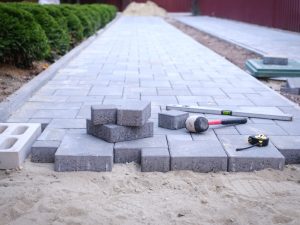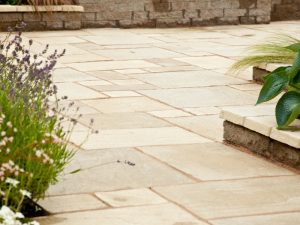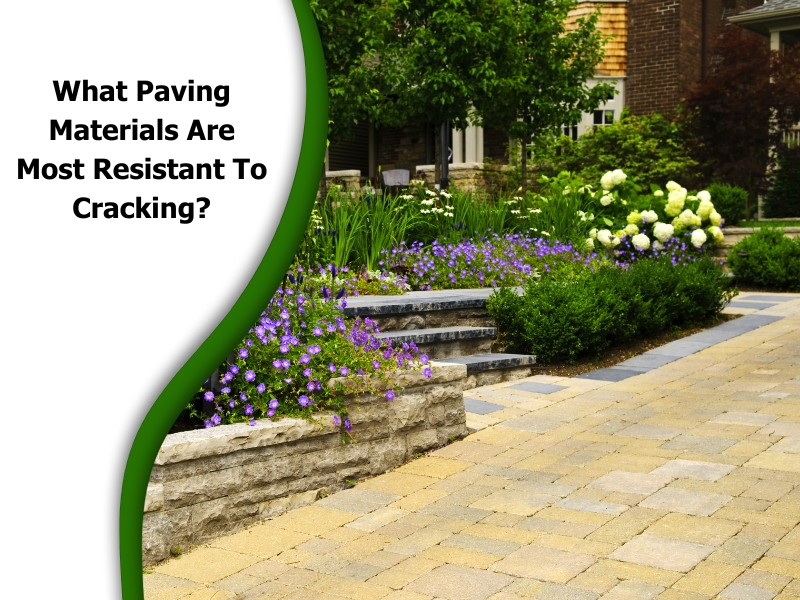Durability and resistance to cracking are essential factors when selecting paving materials for outdoor spaces. Cracks can not only affect the aesthetic appeal of your garden or driveway but can also lead to costly repairs. Understanding which materials are most resistant to cracking is key to ensuring your paving investment lasts long and maintains its appearance. This article will explore the factors contributing to cracks in paving and identify the best materials suited for your outdoor areas.
What are the common causes of cracking in paving?
Cracks in paving can occur for several reasons. Understanding these causes can help prevent damage and prolong the life of your paved areas. Common causes include:
- Thermal expansion and contraction: Changes in temperature cause materials to expand and contract, leading to cracks over time.
- Moisture and water damage: Paving materials that absorb moisture can expand and contract when wet, causing cracks.
- Poor foundation or base preparation: Inadequate base preparation can lead to uneven pressure, resulting in cracks.
- Heavy traffic and load stress: High foot traffic or vehicle weight puts stress on paving materials, causing cracks.
- Settling and shifting: Shifting or settling ground beneath paving can cause uneven pressure and cracks.
How do different types of paving materials compare in terms of durability?
Not all paving materials are created equal. Here’s how common types of paving materials compare in terms of their durability:
- Concrete: Versatile and durable, but prone to cracking if not installed correctly or exposed to extreme weather.
- Asphalt: Durable and flexible but can crack in hot, dry conditions if not appropriately maintained.
- Pavers: Concrete or clay pavers are stronger and more resistant to cracking than solid concrete. They allow slight movement, which is ideal for shifting ground.
- Natural stone: Slate, granite, and sandstone are highly durable, resistant to cracking, and withstand harsh conditions, making them perfect for outdoor use.
Which paving materials offer the best resistance to weather conditions?
Weather impacts the durability of paving materials, with some better suited for specific conditions. Here’s a breakdown of how different materials perform in various weather.
- Concrete: Solid but can crack under extreme temperature fluctuations. Sealing helps reduce water infiltration and cracking.
- Asphalt is flexible and heat-resistant, making it ideal for Sydney’s summers. However, it may soften in very high temperatures and require maintenance.
- Pavers: Concrete and clay pavers resist both heat and cold while allowing slight movements, preventing cracking.
- Natural stone: Highly resistant to temperature fluctuations and heavy rain, offering minimal cracking risk.

Do concrete pavers resist cracking over time?
Concrete pavers are a popular choice due to their affordability and versatility. However, over time, they can become more susceptible to cracking. Here’s why:
- Flexibility: Concrete pavers can move slightly when the ground shifts, reducing the risk of cracking. This makes them the best driveway paving material for areas where the ground may settle or move.
- Individual units: Concrete pavers are separate pieces; if one paver cracks, it can be easily replaced without affecting the surrounding area.
- Proper installation: When installed with the correct base material and jointing, concrete pavers are highly resistant to cracking over time. Polymeric sand for joints helps prevent weeds and adds stability.
How does the weather affect the longevity of paving materials?
Weather conditions, particularly temperature fluctuations, can affect the longevity of paving materials. Here’s how different weather conditions impact paving:
- High heat: In hot climates like Sydney, paving materials can expand, causing stress and leading to cracks, particularly in concrete.
- Freezing temperatures: In areas with freezing temperatures, moisture trapped in paving materials can freeze and expand, causing cracks in concrete or clay pavers.
- Heavy rain and moisture: Excess moisture can expand materials like concrete and clay bricks and grow moss or algae in shaded areas.
- UV exposure: Intense sun can cause some paving materials, like concrete, to fade or crack over time. UV-resistant coatings can help mitigate this damage.
Can natural stone paving materials withstand cracking better than concrete?
Natural stone, such as granite, limestone, and sandstone, tends to have better resistance to cracking compared to concrete. Here’s why natural stone is a durable choice:
- Density and strength: Natural stone is denser and stronger than concrete, making it less susceptible to cracking under heavy loads or extreme weather conditions.
- Thermal resistance: Stone naturally resists the thermal expansion and contraction that can lead to cracking, unlike concrete, which may expand and contract with temperature fluctuations.
- Natural beauty: Besides durability, natural stone offers a timeless look, making it an excellent option for both aesthetics and functionality.

What paving materials are ideal for different climates?
Sydney’s Mediterranean climate, with its hot, dry summers and mild winters, requires paving options that can withstand extreme temperature fluctuations and heavy rainfall. Here are some of the best options for different climates:
- Concrete: While concrete can crack under temperature fluctuations, it’s an ideal option for many paved areas if properly sealed and maintained.
- Pavers: Concrete or clay pavers offer a strong yet flexible option, making them suitable for Sydney’s climate. Their ability to shift slightly helps reduce cracking risk.
- Natural stone: Highly resilient to both heat and rain, natural stone offers a long lifespan and resists cracking even in heavy weather conditions.
How can proper installation help prevent cracking in paving materials?
Proper installation is key to ensuring the longevity of your paving component. Here’s how to prevent cracking through appropriate installation:
- Prepare the base properly: Ensure the base is level compacted and provides proper drainage to avoid shifting or settling, which can cause cracks.
- Leave adequate joint space: Allow sufficient space between pavers to accommodate expansion and contraction.
- Use quality materials: Opt for high-quality paving materials designed to withstand the elements.
- Seal the pavers: Applying a sealant protects the pavers from moisture, reducing the risk of cracking and damage.
Conclusion
Selecting the right paving materials and ensuring proper installation is key to preventing cracks and extending the lifespan of your outdoor surfaces. Whether using natural stone, pavers, or concrete, each offers durability and weather resistance. Expert paving services ensure a job well done, providing a beautiful, functional, and long-lasting outdoor space.
Choosing the right paving materials for durability
If you need assistance in selecting or installing paving materials for your outdoor space, A Bargain Gardener offers a comprehensive range of landscaping and gardening services. With expertise in garden design and construction, we can help you transform your outdoor areas into durable, beautiful spaces. Contact A Bargain Gardener today for a free quote.


